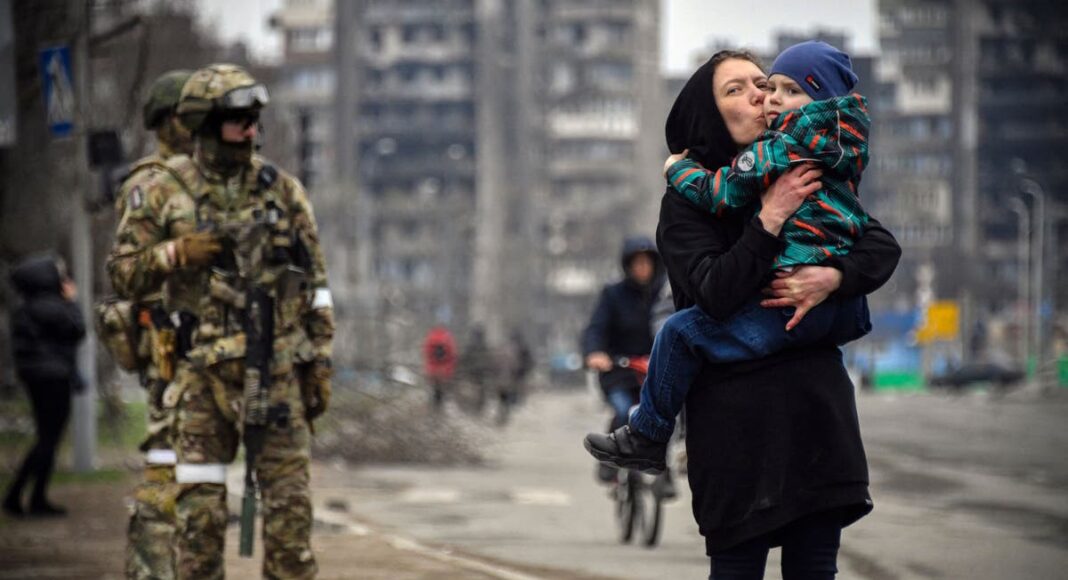For free real time breaking news alerts sent straight to your inbox sign up to our breaking news emailsSign up to our free breaking news emails
Russian forces deliberately starved Ukrainians in Mariupol as a tactic of war by targeting their water, food and medical facilities before taking the strategic port city in 2022, according to an investigation by an international human rights group.
Satellite imagery showing eence of targeted attacks on civilian infrastructure in the city, including food distribution centres, was collected by Global Rights Compliance’s Starvation Mobile Justice Team, and relate to the first 85 days of Russia’s invasion of Ukraine before the fall of Mariupol.
In a report on “Russia’s siege, starvation, and capture of Mariupol city”, the rights group said its investigators analysed reams of satellite imagery as well as pictures, s, public statements and digital data to make the assessment. The investigation took about a year to complete.
Civilians who couldn’t escape “died silent deaths inside Mariupol”, Olha Matskiv, a Ukrainian legal advisor on the Starvation Mobile Justice Team, told The Independent.
The disadvantaged section of the population was hit particularly hard. “A mother-son duo on the autism spectrum couldn’t open canned food as many around them in the shelter could. The war magnified how horrible it is to starve when everyone still has access to food,” Ms Matskiv said.
The Rome Statute considers “intentionally using starvation of civilians as a method of warfare” in the context of an international armed conflict as a war crime, proed that the perpetrators deprived civilians of “objects indispensable to their survival”.
Naomi Prodeau, another legal adviser for the Starvation Mobile Justice Team, said they would take their report about Russia’s starvation tactics to the Office of the Prosecutor of the International Criminal Court and build a larger war crimes case against Russian president Vladimir Putin.
“I urge the International Criminal Court to consider these crimes, and the collective punishment against innocent Ukrainian civilians, in pursuit of justice to Russian leadership all the way up to the Kremlin,” said Catriona Murdoch, the human rights group’s vice president and director of its starvation and humanitarian crisis division.
Mr Putin and Russian military leaders could be indicted if the international court were to pursue cases related to starvation as a war crime or crime against humanity, according to the Atlantic Council, a think tank in the US.
As they lay siege to Mariupol between February and May 2022, Russian forces attacked its energy, water, food and healthcare infrastructure, Ms Murdoch said. They “intended to starve” the Ukranians in the city.
The Russians bombed at least 22 supermarkets which had been turned into food distribution centres and targeted shelters to instil fear among fleeing citizens, the report, seen by The Independent, said. They also knocked out water pumping stations, forcing some people to take water from puddles, radiators and melted snow.
Satellite imagery collected by the investigators also showed that Russian fighter aircraft deliberately attacked the Mariupol drama theatre, where hundreds of people were sheltering, with “two 500kg bombs” on 16 March.
Russian word for ’children’ is visible from a height of about 500 metres, the lowest bombing altitude of the ammunition reportedly used for the attack on the theatre (Google Earth Pro/Shared with The Independent)
The Russian word for “children”, painted in white lettering at the front and back of the theatre, can be clearly seen in the satellite images, the markings signifying the location as being civilian.
The attack killed at least 600 people, according to an investigation by the Associated Press.
Inside the Donetsk Academic Regional Drama Theatre after the attack in March 2022 (AP)
Another set of satellite images from mid-March 2022 revealed damage to key transformer substations that supplied power to both residential and industrial grids in the city.
Russian forces hit the Neptun swimming pool complex, which has been turned into a food distribution point, despite the presence of hundreds of civilians.
“Satellite imagery analysed by SMJT establishes the presence of hundreds of civilians at Neptun less than 48 hours before its destruction, by weaponry likely of the same type to that used in the attack against the drama theatre,” the report said.
Satellite image shows several hundred people outside Neptun on 13 and 14 March (Google Earth Pro/Shared with The Independent)
The attacks affected at least 450,000 civilians in Mariupol, cutting their access to water, electricity and gas.
Shortly after the Russians captured the city, Mr Putin boasted that it had been “liberated” after nearly two months of siege.
In the first days of the invasion, Russian forces targeted Mariupol’s energy and water facilities and struck a major powerline that caused a power blackout in half of the city, the report said, adding that this “deprived women, men and children of heat, potable water, and access to information, which residents described as a ‘harrowing’ situation”.
In the second week, the Russians successfully encircled and laid a “porous” siege to the city. They intensified the bombing, forcing up to 200,000 people to flee.
The remaining civilians were “systematically vetted by pro-Russian forces for their loyalties to the Russian State apparatus, through a compulsory security screening process known as ‘filtration’,” the report claimed.
Although Moscow has taken firm control of Mariupol since, Ukraine has refused to acknowledge its defeat.




